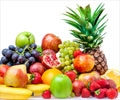A new study by UC Riverside biochemists has revealed that ingesting apigenin, a naturally occurring dietary agent found in vegetables and fruit, improves cancer cells' response to chemotherapy.
Consumption of apigenin, a naturally occurring dietary agent found in vegetables and fruit, improves cancer cells' response to chemotherapy, according to a new study by UC Riverside biochemists.
The leading cause of death in all cancer patients continues to be the resistance of tumour cells to chemotherapy, a form of treatment in which chemicals are used to kill cells.Now, Xuan Liu, a professor of biochemistry, and Xin Cai, a postdoctoral researcher working in her lab, found that apigenin localizes tumour suppressor p53, a protein, in the cell nucleus - a necessary step for killing the cell that results in some tumour cells responding to chemotherapy.
The study provides a novel approach to conquer tumour resistance to chemotherapy, and suggests an avenue for developing safe chemotherapy via naturally occurring agents.
Normally, cells have low levels of p53 diffused in their cytoplasm and nucleus. When DNA in the nucleus is damaged, p53 moves to the nucleus where it activates genes that stop cell growth and cause cell death. In this way, p53 ensures that cells with damaged DNA are killed.
In many cancers, p53 is rendered inactive by a process called cytoplasmic sequestration. Apigenin is able to activate p53 and transport it into the nucleus, resulting in a stop to cell growth and cell death.
"In therapy you want to kill cancer cells. But to stop cell growth and to kill the cell, p53 first needs to be moved to the cell's nucleus to function. Apigenin is very effective in localizing p53 this way," said Cai.
It has been shown by researchers to have growth inhibitory properties in several cancer lines, including breast, colon, skin, thyroid and leukemia cells. It has also been shown to inhibit pancreatic cancer cell proliferation.
The study is published this in the online early edition of the Proceedings of the National Academy of Sciences.
Source-ANI
RAS/SK
 MEDINDIA
MEDINDIA



 Email
Email










